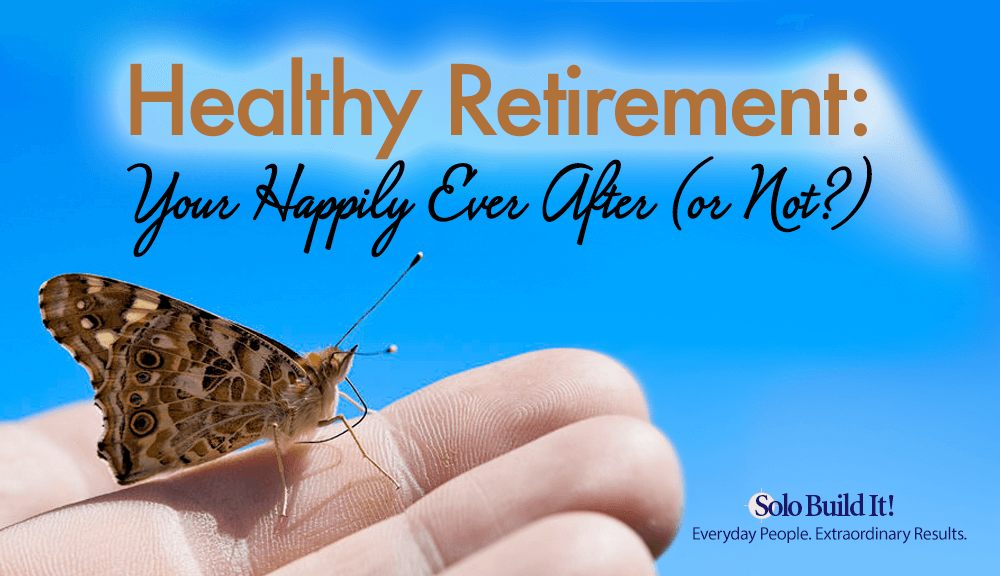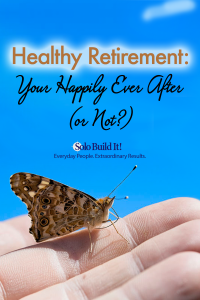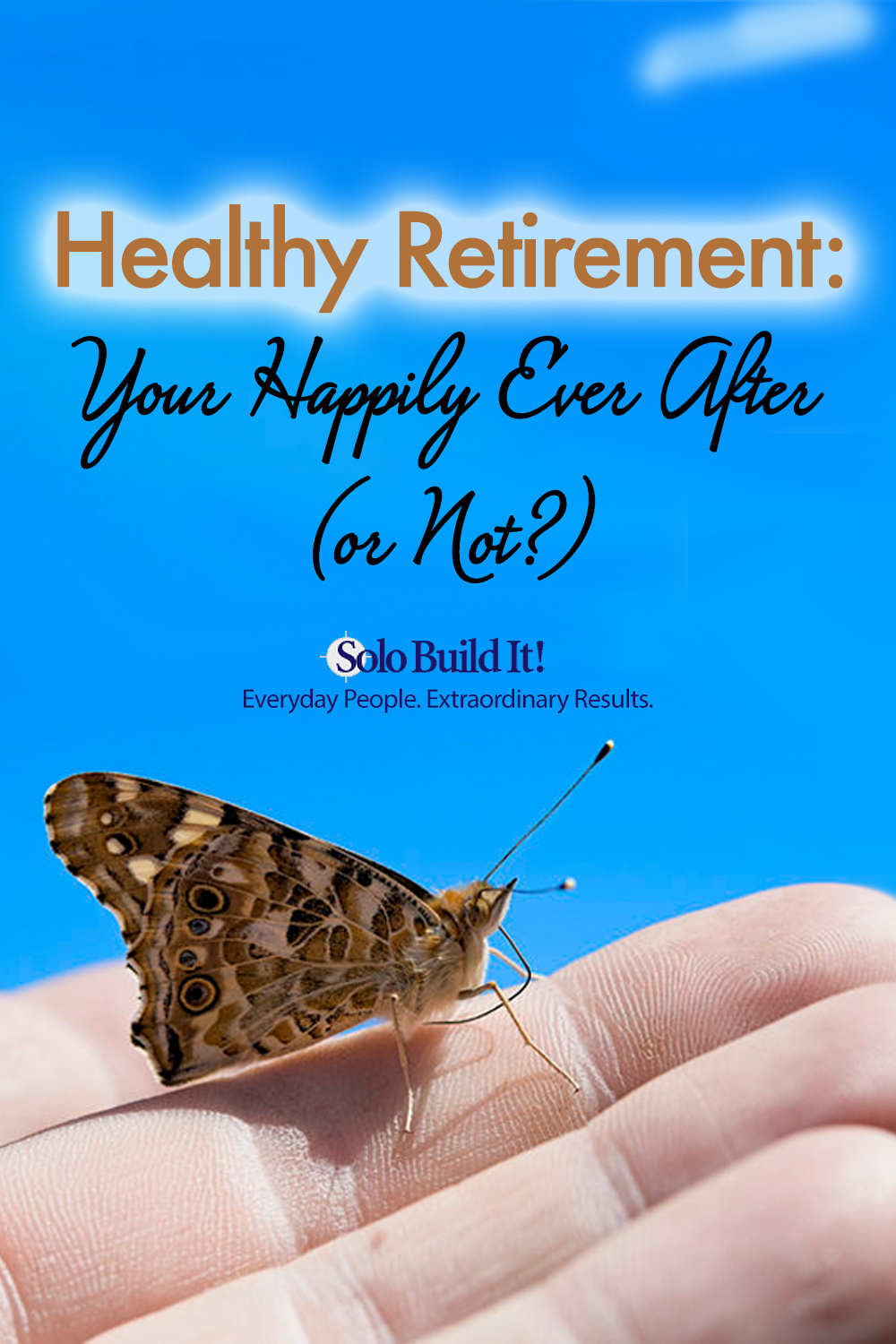
A healthy retirement. You’ve been looking forward to it for years. Trapped in a job you’ve come to dislike so much that it’s causing you stress. Every day.
Been there. Got several tee shirts. My stress was off the radar. I cried most mornings before I got up the courage to go into the office. I hated Sunday, because it meant Monday was not far away. Couldn’t sleep. Couldn’t eat — or ate too much.
You can listen to the full story, or most of it, here. Or read more about the background, here.
What you won’t see is what I did to plan my way out of it. Because actually, I did very little. I kind of let it happen.
Which is why this article was born. Because I don’t want you to do the same.
Perhaps you’re already in transition to retirement. Or maybe you’re younger, at the planning stage. Not wanting to let life pass you by.
Either way, you need to plan. Because I’m here to tell you that, unless you do, retirement can be very bad for your health.
A Healthy Retirement: Is It Possible?

Did you know that retirement is classed as the tenth most stressful life event we’ll ever go through?
How can that be? All that free time stretching out in front of you. No more daily commutes. No more office politics. No more bosses breathing down your neck, no more staff knocking at your door, no more cramming 24 hours’ worth of tasks into ten hours that leave you wrung out and energy-less…
All those stresses — gone!
Or are they? Because you also stand to lose some important parts of life. Parts that have a direct impact on health.
Structure. A daily schedule. Tasks to keep your brain active. Relationships. Friendships, even. And money, of course.
Your retirement income may worry you. Pensions these days are not what they used to be. Sometimes they don’t exist at all. And although money isn’t everything, lack of money can become an explosive pressure point.
Add to that the dramatic increase in life expectancy with all the advances in medicine and technology, and elimination of the illnesses that often come as part of the ageing process, and we may have a problem.
Far from a healthy, happy retirement, there’s the potential for gloom and doom.
 Unless we plan.
Unless we plan.
Predicting how retirement may affect you — or may already be affecting you — is difficult. So many factors come into play.
All any of us really want is to thrive in retirement, to be happy, healthy and preferably wealthy. And some fairly straightforward life planning can at the very least curb some, if not all, of those problems.
So let’s start planning for a healthy retirement now, by examining the three most common problem areas after retiring: physical, emotional and financial health.
Preparing for a Healthy Retirement: Physical Health
“People are living longer than ever and so retirement presents a real opportunity for baby boomers to be more active than ever before. For many people it is a chance to take on new challenges. It is certainly not the start of a slower pace of life it once was.”Dame Sally Davies, Chief Medical Officer, UK, 2019.
Facts about health at retirement age can make dismal reading. 40% more likely to have a heart attack or stroke(1). Twice the number of retired people vs working at the same age suffer from chronic conditions like cancer, stroke and diabetes.
Of course, poor health may be one reason individuals retire in the first place rather than a result of retirement. Some people may be forced to quit their job due to chronic illness. Or some unexpected illness strikes in spite of all our efforts to stay healthy.
But there’s evidence that some of the factors we’ve already looked at, particularly social isolation and lack of structure, lead to poor lifestyle choices — poor diet, for example, or excessive alcohol consumption.
In which case an unhealthy retirement looks gloomily more likely than not.
But wait…
Other studies(e.g., 2) have shown that retiring is good for our health.
What makes the difference, then, between a healthy and an unhealthy retirement?
Invest in Eating Well
 Some people improve their diets in retirement. Others don’t. One study(3) showed that women improved their eating habits when they retired but men didn’t.
Some people improve their diets in retirement. Others don’t. One study(3) showed that women improved their eating habits when they retired but men didn’t.
Which will you be?
You’ll have the time. Choose healthy foods. You have the time to prepare meals rather than rely on processed foods.
It’s not only healthier, it’s less expensive.
Invest in Physical Activity — Now
Whether you’re already retired or you’re planning your retirement, get moving. You’re no longer constrained by the time demands of full-time work. You have the space. You just need to find the motivation to do it.
Which, if you’ve spent your working life sitting at a computer or in some other sedentary job, can be difficult. It requires not just an investment of time, but of motivation. It doesn’t mean that you need to go on a ten mile run. In fact, if you’ve not done physical exercise for a while, that could be positively dangerous.
Nor does it mean you need to spend a large part of your retirement pension on a gym membership. You probably won’t use it anyway. Better to find something you can do from your doorway, something you can add into your daily routine.
Here’s how it can be done. Think back to your childhood. What did you love to do? For me, it was cycling. The freedom of going anywhere (well, within reason) under my own steam. Re-finding my love for my bikes didn’t just get me fit. It took me on amazing journeys through Europe and Africa, on holidays and fundraising challenges.

What about roller-skating? Or as the youngsters now call it, inline skating? Or skipping (“jumping rope” in the US). Who in the UK remembers “Bluebells, cockle shells”?
It might have lost its popularity, but there’s a reason boxers use skipping as part of their warm-up routine.
Fancy growing your own veggies? Gardening is a great exercise to choose — and you have something practical at the end of it. Want to become more supple? Try swimming or yoga. For even more inspiration, check out these five retirement ideas.
Don’t leave it until you retire. Or, if you’re retired, don’t leave it until your health starts to decline. Choose something you think you’d enjoy and make it part of your daily routine — now.
How to Prepare for a Healthy Retirement: Psychological Health
More gloom.
“Retirement increases the probability of suffering from clinical depression by about 40%.”(4)
“The mental health needs of baby boomers are substantial in many respects, with 18% reported to have depression or anxiety disorder. This is twice the proportion in the generation born before 1945.”(5)
The critical issue here is not so much the depression itself, but what causes it. Reports suggest a variety of potential origins: lack of structure and losing the essence of self may be top of the pile.
And where are the challenges? How do we prevent boredom in retirement? Where’s the companionship?
We have choices here. We can sit and ruminate (“how did life come to this?”) or we can plan to do something about it.
How to Deal With Loneliness
There’s no doubt that the single most important factor of depression in retirement is a feeling of isolation.
We go from seeing many people, of all ages and from different walks of life, every day, to seeing no one apart from perhaps our partner and family.
It doesn’t automatically happen immediately. There are the retirement parties, the lunch with ex-colleagues, the night out for Christmas that you’ve been invited back to.
Slowly but surely, though, they evaporate. Working life goes on for most, and you’re no longer part of that world. Suddenly you have nothing in common any more. The companionship has disappeared. A kind of grief sets in, mourning the loss of a whole way of life:
“I thought that I was ready to retire mentally — but found that it actually took me three years to adjust — I grieved for my job and that process took that long. There was no help or recognition about the grieving process. I had to work through that myself, and it was only after I came out the other end that I realized what had happened to me.”(Excerpt from “Women and Retirement,” Susan Moore and Doreen Rosenthal.)
Which is when those replacement activities come into their own. The “occasional” glass of wine in an afternoon that turns into a bottle a day. The odd flutter on the horses that becomes an obsession with greyhound racing.
Invest in Your Own Mental Health for Retirement
By now, you shouldn’t be surprised to learn that my advice for this is: plan. Find things to do in retirement before the event.
You may think it won’t happen to you — and it may not. Your life may be so full of interests and hobbies outside work that retirement will be an entirely positive experience.
But even if you’re lucky enough to have a large pension pot, the joy of having all day to solve crosswords will start to wane.
So, just in case…
Revisit the Need to Move
Exercise of any kind is known to release endorphins. And endorphins help deal with stress.
I can hear you now: “oh please, not the exercise thing again…”
I do hear you. I understand. I’m not keen on it either. But you just need to leave the house every day. So consider what would make you want to do that.
For me, when cycling became difficult, it was a little rescue Yorkshire Terrier called Alexia. She was almost ten when she was abandoned in a kill shelter. Her owners no longer wanted her because she was too old. That struck a chord…
Alexia is now nearly 13 years old — and loves her walks. When she’s not wanting walks, she wants to play. She does not allow me to veg out in front of the TV.

So not only did I rescue her from death, she rescued me from poor health.
Which leads me to…
Focus Outwards
“Lonely people have a 50% higher chance of premature death.”(6)
It can be hard, but focusing on other people, or animals, by contributing to your community can be a life-saver — literally.
Focusing inwards on your own feelings of isolation and lack of social support can mean loneliness slips into clinical depression. And that’s hard to climb out of.
When we focus on others, contributing what we can to individuals, to our community or to society at large, happiness comes naturally.
So before it takes hold (wait for it…) — plan. How can you find meaning in retirement?
If money isn’t an issue, try volunteering. Find something that resonates with you, whether that’s a donkey sanctuary, a charity shop or a hospice. It’s like work, but different.
In planning my own retirement, I volunteered in the kitchens of a hospice for several years. It gave me a whole new outlook — and many new friends. Without the responsibilities I was used to at my day job, all I had to accomplish was to turn up and do as good a job as I possibly could, whether that was peeling carrots, washing dishes or setting the tea-trays for patients.
The important thing was knowing I made a difference, no matter how small.
Plan to make your days meaningful. Plan to make a difference. Give your retirement life as much, or more, of a sense of purpose than you had while at your paid work.
Combat Loneliness With Family Relationships

Family relationships will change with retirement. How might that affect you and your family? There’s a balance to be had here…
Your world can narrow as you lose your working life, or it can broaden its horizons as you rediscover old interests with your partner, or invest in new.
And it doesn’t have to be as drastic as moving to Italy (although I do recommend it!).
But you do need to plan. What’s it going to be like to spend all day, every day, together? If one of you is retired and the other isn’t, how will your expectations of each other change?
If you have adult children, what will their expectations be? How will you set boundaries if you’re expected to become an unpaid child-minder? Is it something you’d embrace, or start to resent?
How to avoid these conflicts? Talk. Staying silent and hoping for the best is not an option.
Prepare for a Healthy Retirement: Financial Health

This may be the plan that you think will be hardest to make. Financial hardship is, for many, a real part of retirement. Pensions we thought would take us comfortably through our days have lost value. Jobs we thought would last forever suddenly end, for reasons way beyond our control, and retirement becomes not a choice but compulsory.
No longer can we splash out money on “luxuries” like vacations abroad. Even taking grandchildren out for the day can become an expense we can’t manage. Housing and adequate health care become problematic, and the ability to engage in new opportunities feels not just limited, but impossible.
So I’m going to suggest you do something that may surprise you.
Go back to work.
Invest in Your Financial Security: Be an Employee
Some people stop work on a Friday, only to return in a slightly different capacity on a Monday. I’ve seen it with colleagues in the UK.
I’m not going to suggest you do that.
Why not? Because it’s limiting.
The chances are you chose your job when you were much younger. You may still have liked it when you retired, but returning to it doesn’t stretch you. And stretching — both physically and mentally – is an important part of a healthy retirement.
So what, then?
Think about your ambitions when you were young. What did you want to “be”? Could you return to something like that?
I’d always wanted to be a veterinary surgeon. I didn’t get to do it for reasons I won’t bore you with. But suffice it to say the longing never left me.
So when I retired, I took a job as a receptionist at a local vet clinic. Not quite the same, I know. But I took pride in making animals and their owners feel special, for the time they were with us. I got to know them. It satisfied the “keep making contacts with people” part of retirement, and it gave me a huge sense of satisfaction.
And I got paid for doing it.
What could you do?
Invest in Your Financial Security: Start an Online Business
Does that feel too scary? It’s not. Plan, with an open mind. This may be the first time for a very long time you’ve been able to start with a clean slate.
Think hard about how you want to fill that slate, ideally while you’re still at work. If you’re already retired, do it now.
Forget anything that will create more wasted time on a long commute. Forget working for someone else who may or may not appreciate your knowledge, skills and experience. Re-frame your ideas about work.
Work instead for someone who will appreciate you. Yourself.
It’s what I did. I had no idea when I took early retirement that one day I would have a successful online business about chickens. But I do. Last month, it made me roughly double the money I’d made in my (very stressful) full-time job.
It didn’t come overnight, and it’s not an easy ride. No “get rich quick” scams here!
But is it satisfying? Does it give me a sense of identity? Does it provide the friendships and contacts I missed from working in an office? Does it make me feel age is no barrier, wherever I may choose to go?
You bet it does.
And I’m not the only one. My colleague Mike Miller’s experiences are similar.
As Mike puts it: “I feel relevant.”
And that, as much as the money, is the answer to many retirement hardships.
My Healthy Retirement Wish for You
“People spend more time planning a wedding than planning retirement. It’s very important to think about your identity and what you’re losing, and how you get a new identity.”Nancy Schlossberg: Too Young to be Old: Love, Learn, Work and Play as you Age.
A happy, healthy retirement isn’t about sitting around watching the world go by. It’s about starting an adventure. A new phase of your life. It’s a time to use your experience to appreciate the opportunities in front of you.
It’s your time. Be kind to yourself.
Whether you’re still working and planning your retirement, or you’ve already retired and you’re looking to plan the years ahead, think about what would give you a sense of meaning.
What is your retirement wish for yourself?
Visualize the kind of person you want to become. The kind of life you want to lead. And then — grab it with both hands. Now, before it’s too late.
And may you live long, and prosper.
Sources and Further Reading
- Moon, J. R. et al: Transition to Retirement and Risk of Cardiovascular Disease: Prospective Analysis of the US Health and Retirement Study. Pub. Social Science and Medicine, 2012.
- Hessel, P.: Does retirement (really) lead to worse health among European men and women across all educational levels? Pub. Social Science and Medicine, 2016.
- Helina, A. et al: Changes in healthy food habits after transition to old age retirement. Pub. European Journal of Public Health, 2011.
- Sahlgren, G. H.: Work Longer, Live Healthier. Pub. Institute of Economic Affairs, 2013.
- Davies, Professor Dame S.: Baby Boomers: Fit for the Future. Pub. Department of Health, 2016.
- Holt-Lunstad, J., et al: Social Relationships and Mortality Risk: A Meta-Analytic Review. Pub. PLOS Medicine, 2010.

Cath Andrews
Latest posts by Cath Andrews (see all)
- Start a Passion-Based Business and Live Your Dream - February 1, 2023
- What Do You Say When Their Eyes Glaze Over? - December 20, 2021
- How to Monetize Your Email List in 5 Simple Steps - October 26, 2021

